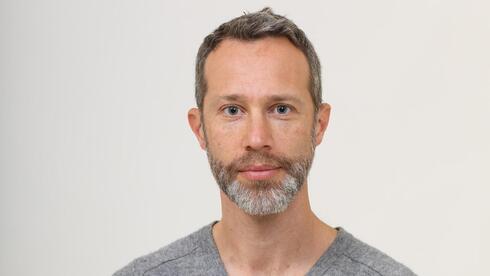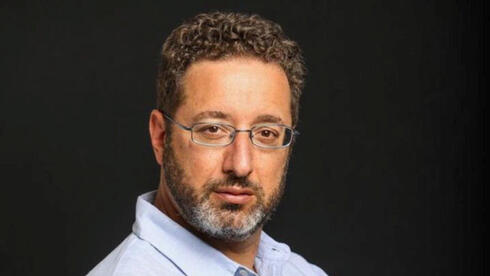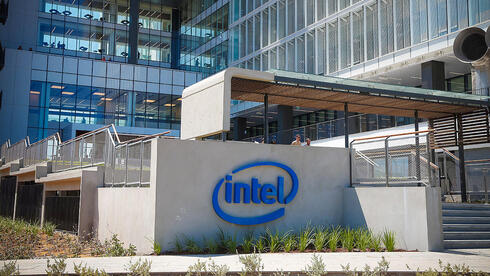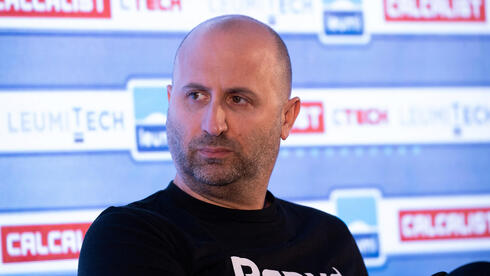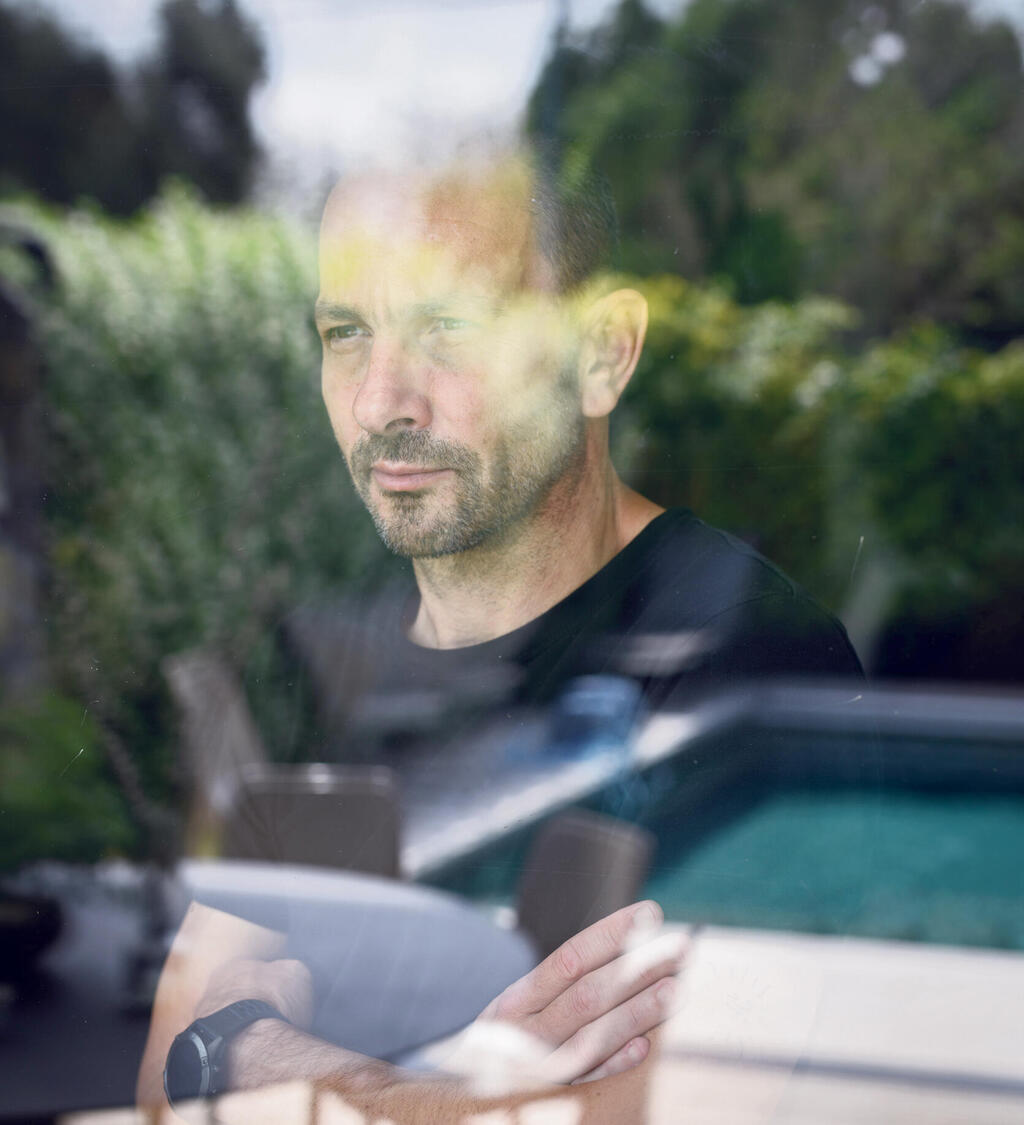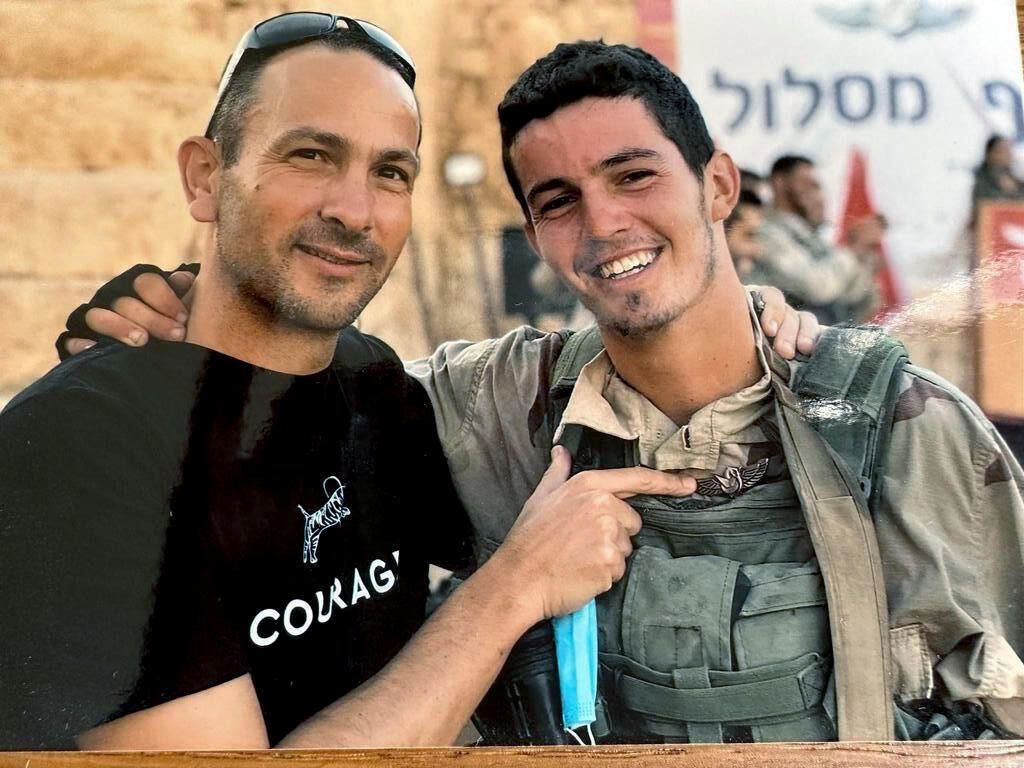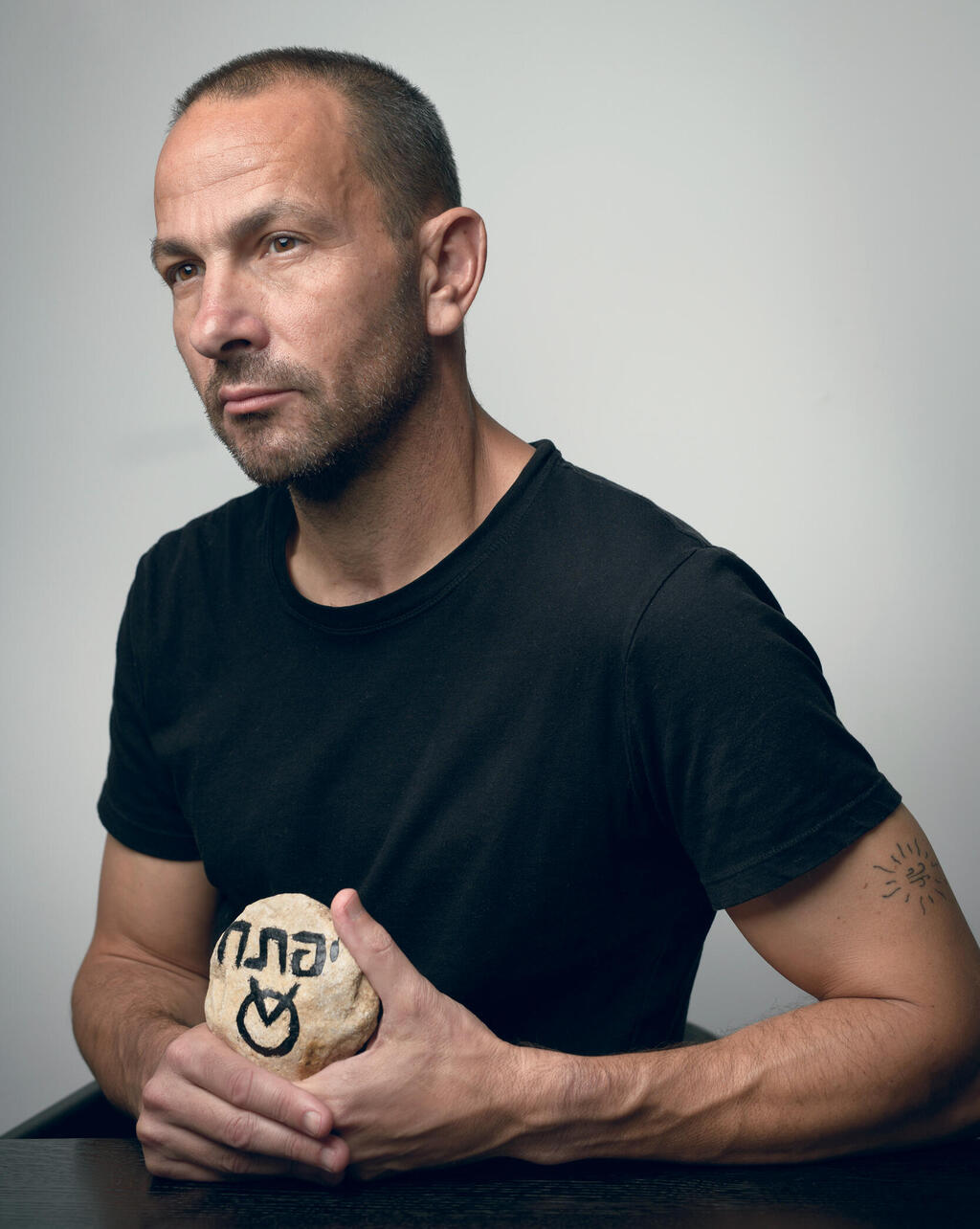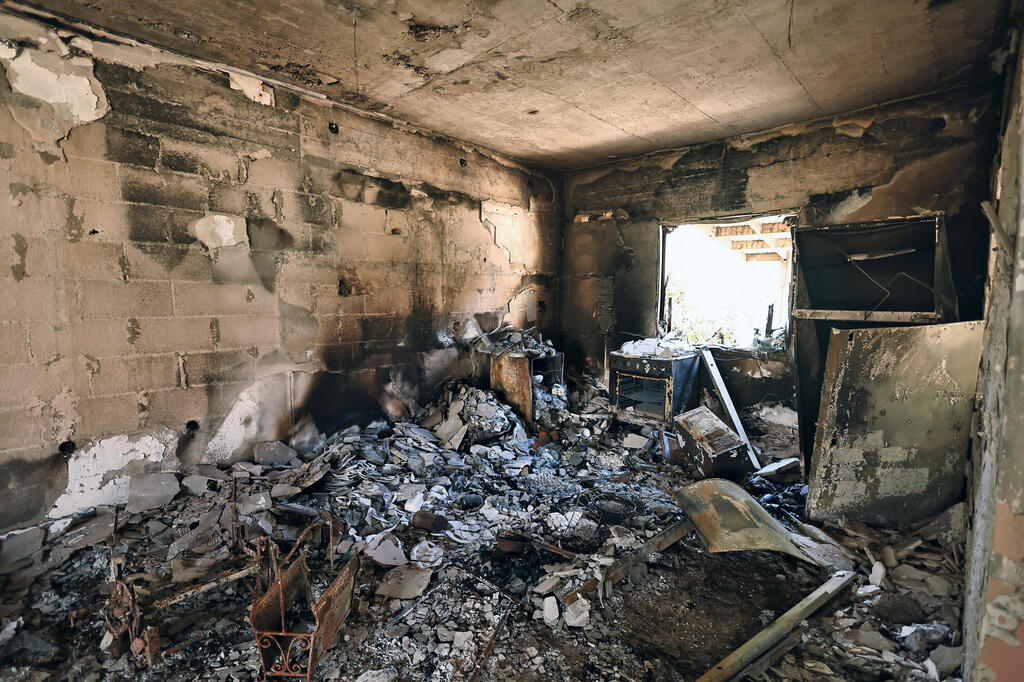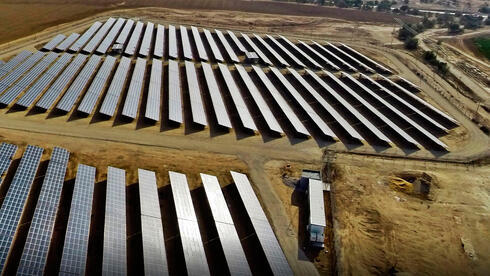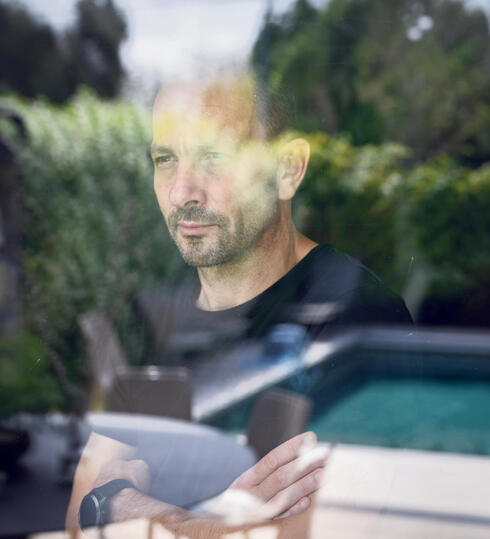
Enlight unto the nation: Gilad Yavetz carries on legacy of fallen soldier son
Enlight unto the nation: Gilad Yavetz carries on legacy of fallen soldier son
On October 7, at a quarter to 8 in the morning, Gilad Yavetz spoke to his son Yiftah for the last time. "There's a big mess. Dozens of terrorists are inside the country, we'll talk later," Yiftah, who served in the Maglan Unit of the Commando Brigade, told him. About four hours later, he was killed in the defense of Nahal Oz. In an exclusive interview, Yavetz talks about the terrible loss, explains the values he instilled in his son, and how he will continue his legacy: through assistance to the people of Nahal Oz and by combining the renewable energy giant that he leads, Enlight, in the rehabilitation of all the Gaza border communities.
I visited the house of Gilad Yavetz in Ramat Hasharon for the first time in October, during the shivah (week of mourning) for his son Yiftah. A huge crowd of comforters, friends, family, acquaintances and members of the high-tech community filled the house and the large yard to capacity. It was almost impossible to move, as if the visitors wanted to prevent the immense grief from penetrating with their bodies.
Now, when I arrive for the first personal and extensive interview with Yavetz since Yiftah fell in battle on October 7, the first thing that strikes me is the silence. "Last time it was during the shivah," he recognizes my momentary embarrassment. "Shivah is an event that passes by you behind a veil of fog, you are two-thirds aware." He chooses to hold the interview outside.
Captain Yiftah Yavetz was an outstanding tennis player and could have chosen to continue this path in the army, but chose to serve in Maglan, the unit where his parents met - Shira was in charge of education in the unit, Gilad was a soldier. Although the parents had already divorced, Maglan remained in a sense the military "home" of the family, and Gilad still serves as the chairman of the Friends of Maglan Foundation. Yiftah, the operations officer of the Maglan reconnaissance unit, was set to be discharged this year.
"On Saturday, October 7, we planned an outing, the whole extended family, in the Golan Heights," Yavetz says. "In the morning I was about to go for a run with my wife Naomi, we were already at the beach for that, and then Yiftah, who was sleeping in our house in Ramat Hasharon, called to say he was going out. On his own initiative and in consultation with the commanders in the unit, he already called all the fighters from their homes, without waiting for orders from above. Our last call with him was from the car at a quarter to eight. He told us: 'There is a big mess, dozens of terrorists are inside the country, we'll talk later.'
"This is what Yiftah was: an officer on vacation, who left home within 15 minutes, understanding the need to reach the battle in the south with unimaginable speed. And he had the emotional intelligence to understand their (the residents of the area) need to hear: 'We are coming, you are not alone, we are with you.' We found a message on his phone that he sent to Nahal Oz security head, Ilan Fiorentino. He did not know that Ilan had already been killed. He wrote to him: 'Ilan, this is Yiftah Yavetz, the Maglan operations officer. Hold on, we are on our way to you.'"
Yiftah failed to enter Nahal Oz. After noon he and his men encountered terrorists on the outskirts of the kibbutz, and he was killed in battle alongside two other soldiers. "Yiftah managed to kill a terrorist, but then the force was hit by fire. In retrospect, it became clear that those who raced first into the settlements without delay were able to make contact, and in fact block with their bodies, with bravery, the spread of the horrible acts that were taking place there. Those who did not enter first, who waited to get a better picture of the situation, to gather more forces - they may have managed to survive, but in those places more civilians were killed, tortured and kidnapped. See the case of Nir Oz, where forces did not arrive at all. In Nahal Oz, 15 people were kidnapped, of which five have already returned to us. It could have ended much worse."
The night before, on Friday night, you still managed to celebrate your birthday.
"Unfortunately, my birthday is on October 7th. I probably won't celebrate it anymore."
"If I had to redo my life, I wouldn't change a thing"
"On family birthdays," Yavetz breaks the silence that lingered for a moment, "we always ask the children not to buy presents, but that everyone write blessings. On Friday evening we gathered to eat at a restaurant in Tel Aviv, we were a little late, and there was no time, but Yiftah insisted, before we left, to stand and recite his blessing, it was a very significant blessing, and he recited it festively."
"Dad, you are my hero," wrote Yiftah in the blessing, which bears the date October 7. "When I get confused, wonder, when I stumble, when I ask - you are always there. Sometimes from the front - pulling me, showing me how not to give up, how to fight, how to demand from myself and the surroundings. Sometimes from behind - pushing me, supporting me, hugging and strengthening, helping when it's hard... I'm already 23 years old, and you're 53. It's not a short road we have traveled together. Sometimes I manage to recognize your footprints on this road, they are embedded in the ground and mark my path. I try to match the size of my shoes with yours, usually without success. I wish you to remain the person you are, the warrior, the sensitive and the professional. But above all, I am proud of you, for what you are doing, for the life work you have established with your own hands, in the world and in our country. I understand the willingness of Enlight employees to follow you at all costs, without you demanding it from them, but only because of what you are for them. I love you very much, and I'm very happy that you were born."
Yavetz Sr., one of the founders and CEO of the renewable energy company Enlight, says that "there were letters like this, quite a few, that I wrote to him and he to me, no less significant than this." He did not know that this would be the last letter that Yiftah would write. And he did not know that it would be the penultimate one he would receive from him; that after his death the family would receive a farewell message from him, in case he was killed. He wrote it in June, before a dangerous operation in Jenin. "I'm trying to imagine the next few hours. To lead this thing, to be there first in the most complex part - this is exactly what you taught me to do," wrote Yiftah to his parents and siblings. "And when the thoughts escape a little, why us and why now, that's what I think about, and suddenly the answer is very clear to me. To fight for this country, to lead this unit, it's not supreme heroism - it's a standard. If I had to redo my life, I wouldn't change a thing. I love you."
"This is who we are, this is our country, this is what is required"
At noon that Saturday, the scope and depth of the disaster were not yet known. Even Gilad, an experienced warrior, had no idea what was happening in the field. "I wrote a message to Yiftah at 12:30, the encounter with the terrorists was at 12:07, I think I sent him the message in his last minutes alive."
What did you write to him?
"'My hero, I'm sure everything is crazy, I'm proud and know that you're one of the commanders the IDF can count on in this difficult time to protect the State of Israel and defeat evil. Every sign of life you can send, don't wait, and send. Even one word. You understand that the worrying burns the heart. I love you so much'".
And then...
"At a certain point I saw two gray check marks. Not blue, meaning the message was not read, but it was received. I chose to understand that he opened the phone, so for a certain period of time I was optimistic, there was hope. At some point I even said: Wait, why isn't he writing even a single word to me?".
When did the feeling that something was wrong start?
"As a former soldier in the unit and chairman of the Friends of Maglan Foundation in recent years, I am naturally in constant contact with the members of the regular and reserve units. We were in contact during the day, but in the afternoon I felt that the members of the unit began to communicate with me less. The anxiety started creeping in."
At the same time, during these hours, Yavetz was keeping busy. "We have a family in Yad Mordechai and I ran to bring mattresses to host them with us, after they were rescued from the shelters, nine people came to us. There was even an emotional reunion between mother and daughter who worried very much for each other."
At night the worry increased. "At half past midnight, I saw on TV Noam Tivon (a Major General who himself participated in the rescue of residents of Gaza border towns that day) talking about a battle in Nahal Oz, about the bravery of the fighters, and said that there were casualties. He was actually telling about the battle in which Yiftah was killed. At this point I was already very worried, because there was still no contact (with Yiftah), and I felt it was not good."
When did the news come?
"At 1:10 am. the informers knocked on the door. My wife Naomi immediately started crying. I said: 'Don't cry, it's war, maybe it's a neighbor who came to say something,' but she said: 'No. It can only be one thing.' A terrible moment."
Yavetz, a veteran manager, clinged to this side of himself. "I realized that this was the news I was going to receive, and I switched to automatic pilot mode of managing the event. To understand what happened, and to take care of my family. I wanted first of all to get some information, to know where Yiftah is physically located and if I can see him. For better or worse, in these situations I switch to automatic, managerial mode. To stay functional, not to fall apart. I have also seen Yiftah managing in such difficult situations."
On Yiftah's tombstone, the family chose to engrave the sentence from the farewell letter he prepared ahead of time, "If I had to redo my life, I wouldn't change a thing."
He left you this message.
"Yes. Before that operation in Jenin, with the troubling knowledge that there were fighters who might not return, he found the time to write something whose entire purpose was to allow us to live in a more complete way, should the worst happen to him. This is a very noble act on his part. He thought about what he can leave us that will make us feel less bad."
You often write about him on your Facebook account. You describe him as a moral young man, the first to help, and also deep, a brave warrior with a sensitive soul. Is there comfort in thinking about the person he was, a person capable of writing a farewell letter that would strengthen his family after his death?
"If there are things that comfort us, it is that he was a complete child. He was very special and deep in his outlook on life, read a lot, wrote a lot, had many meaningful relationships with people, he experienced love. So from our perspective today, he lived a short but complete life. So when I imagine his life I think of it not as a broken line but as a circle that could have been huge and was smaller than we wanted, but not a line.
"It is also comforting that others are inspired by him, including those who did not know him personally. That his presence is still here. And it comforts me that we were able to say everything to each other. We were connected on the deepest level possible, in talking and in writing and also without words. We talked about how much we love each other and learn from one another. So I wasn't left with the feeling of 'why didn't I tell him, how did he not know'. I want to believe that, in his last moments, he was dealing with the future, not with the past."
And doesn't a thought creep in sometimes that you shouldn't have directed him to contribute in such a dangerous way, to the values that cost him his life, to be the first to arrive on the battlefield?
"Michal, Yiftah's sister, is going to enlist this year. She went through difficult screenings for a position where she could be in dangerous places. Shortly after Yiftah was killed, we were contacted by the IDF and we had to give our consent to this route she chose. And we signed off despite the almost paralyzing fear of another loss. So to the question about this value line - this is who we are. This is our country, this is what is required. But everyone has to be a part of it. All sectors. There must be equality. The biggest disaster that can happen to a person in his life happened to us. Burying your son - there is no greater tragedy than this, and it is not something that can be reversed. Nevertheless, we understand that educating to such values is the right way, because there is no choice."
"Yiftah can no longer be returned, but the abductees still can"
A few weeks later, Yavetz returned to work. "Only at night, alone or with my wife, can I unwind," he says. The rest of the time, "our struggle is how not to deal with 'why do I deserve this', but to find the actions that continue Yiftah's path, his light. Not to fall into the darkness, into the abyss. Every second you can fall, and from time to time you do fall. But we use the light of Yiftah to help us walk on the razor’s edge. It is a choice every day. To think about how I take Yiftah with me to guide me and not descend into the darkness. To continue his legacy - that's what guides me."
And he does this in a project that supports youth in Kiryat Malachi, in the Friends of Maglan Foundation, and by accompanying the people of Nahal Oz. "It's to continue where Yiftah stopped in the most basic sense," Yavetz explains. "He stopped there, and I will continue there. This is how I feel our circularity in the most refined way: from the place where I began my path as a warrior, he continued as a commander, and his path that was interrupted in the defense of Nahal Oz, I and others will now continue.
"Beyond that, this is what I feel is important to us as a country. I found in Nahal Oz a charming and extraordinary community in the biggest crisis possible. A community that bravely faces a situation that no manager should have to face alone, and I am happy that close and extraordinary relations have been established with the kibbutz community and its leaders and with the Bazan company led by Major General Moshe Kaplinsky, who is our full partner in the process and made itself available to the kibbutz from the first moment. The people of Nahal Oz and I will heal together, with each other's strengths."
What are you doing with the community?
"We accompany them in everything, in the rehabilitation, in the business dealings. We will not abandon them. The goal of the community is that within five years the kibbutz will return to prosperity, and will be 100% paradise."
And does going back to work help?
"Yes. Every day is difficult, the struggle is daily. And the right thing for me is a combination of time with the family, social activities and returning to work. I returned gradually, at first only to conversations with the management, while giving extensive responsibilities to the leading managers in the company, who reported to me and consulted with me only when needed, and gradually I returned to full activity."
Bereaved parents sometimes say that the environment does not know how to handle them, that people are afraid to even ask about their well-being.
"The answer to the question 'How are you?' is indeed complicated. I realized that it's better for me if they say 'I'm with you.’ There are those who have this intuition, to express solidarity, but even if not - we understand. Even if they ask how I am, I remember that it comes from a good place. When they ask what's up with me, I say fine, an answer that doesn't require opening a philosophical discussion."
Yiftah, who besides playing tennis also played the piano and learned carpentry, actually grew up with four parents, after his mother Shira and his father divorced when he was a year and a half old and remarried. "We both started new families and shared Yiftah's upbringing in a very collaborative way, he grew up in both homes, feeling that he had four parents. He was very attached to the four of us. And he came to the conclusion that family is the most important thing. He also extended this to his team in the army - the team is everything."
Once, Yiftah wrote on the family message board at home, "Family over everything". He has five siblings: three from his mother's side, Tamar (18), Yael (17) and Dan (14), and two from his father's side, Michal (19) and Ella (15). After his death, they got a tattoo of that sentence of his, "Family over everything". His other brothers, his mother's partner and friends burned into their skin the "Yiftah tattoo", which he made with his mother Shira in 2017: "I>ΛV". "It basically means - I am greater than my ups and downs," explains his father.
Will you also have a tattoo in his memory?
"I believe so, something to do with the bond between us, its eternalness."
Since October 7, tattoos have become a common means of commemoration and memory.
"It's a kind of vow. The war came against the background of a great rift in Israeli society, and I think people are looking for a new alliance, something that can be sworn on together. A tattoo is a kind of vow that goes with you, and there is a feeling that it can give you strength. Everything is still fresh, the commemoration of this war is still emerging. The tattoos, as well as the social networks, with their ability to echo the legacy and stories, are part of the new commemoration."
In the midst of the personal and general disaster, what is important to you today?
"Before anything else - bring back the hostages. When you are faced with a loss, there is not a day when you do not deal with the questions of turning the wheel back, what would have happened if, etc. Unfortunately, Yiftah's wheel has stopped, it will not be possible for it to turn again. As a bereaved father, one of the greatest challenges is the finality. But the hostages can still be saved, we can still do this miracle, with them it is still not irreversible. Their wheel can be turned back and life can be restored to the hostages and their families who walk among us without life. For me, this defines a victory no less than a military victory."
And in a broad sense, what would be victory in your eyes?
"A revival. We need a revival from the situation we have reached. This should also be the name of this war. We have reached the bottom of the ladder, and part of the revival is to reproduce what we have lost. To return the kidnapped, to return the displaced to their homes and to their jobs, to return to our lives that since October 7th have not been the same, to return to the mutual bond, and to make amends, that will be the victory."
When he looks at what led to the war, he says that "Beyond the intelligence and operational failure, a long-standing political concept has collapsed according to which it is possible to contain extreme Islam while it is strengthening on our borders in the south and north, with rounds of conflict from time to time and the preservation of the policy of separation and rule between Gaza and Judea and Samaria." Looking at those under whose leadership the failure occurred, he says that "at this point the entire military and political elite should take responsibility and resign. There should be a joint decision to go to elections. After what happened, the public must decide how they want to proceed from here, even if the existing leadership is re-elected. The MKs must understand the magnitude of the hour, demonstrate leadership, stop the political game and agree on elections."
"It will be expensive and complicated for Yitzhak Tshuva to buy us"
Yavetz worked for years as a tech manager, and in 2008 he was one of the founders of Enlight, which builds and operates facilities for the production of solar energy, wind turbines and energy storage. So far, it has already built hundreds of them, in Israel, Europe and the United States. In February 2023, it was issued on Nasdaq, and is currently traded there at a value of approximately $2 billion. Last year, the company's revenues were $256 million, the net profit was approximately $71 million, the growth in production capacity reached almost 40%, and the number of employees has already climbed to approximately 300.
And now Enlight is also part of the support that Yavetz provides to Nahal Oz. He dreams of a rehabilitated area that will be at the forefront of Israel's renewable electricity sector. "We want to establish a sustainable economic life in the kibbutz. We help them in the worlds of green energy, agritech and other fields. The localities of the region, as well as the localities of the northern border, have the potential to solve Israel's existential energy security needs - it is possible to establish a decentralized system of green and cheap energy in all these places, on available agricultural land. We even help the kibbutz to promote activities with Enlight's competitors, with whom they already have previous agreements."
Isn’t it problematic to establish renewable energy projects in Israel in an area that is prone to attacks?
"One of the amazing things about renewable energy is that it is relatively difficult to damage these infrastructures - they are very decentralized, both the solar systems and the wind systems. When missiles fell on solar systems in the Gaza border area, only 1% of them stopped working. On the other hand, damage to gas rigs or power plants will cause enormous damage to the supply of electricity."
Yavetz talks about the company he has managed since its inception with pride and even love. "It is part of what we do here in the country as citizens," he says. "It is a tremendous business success, for 15 consecutive years it has tripled itself every three years, and it has the intention to continue doing this in the coming years." But that's not the whole story. "For me, it is also a family where people are willing to give everything for me and I for them. Everyone there allowed me to choose if, when and how to return to work, while some of the senior managers served in the reserves, pilots, fighters in all arms of the IDF. For me, this was another sign that we have built an amazing company, which will continue to grow, with or without me, for decades."
With all the importance of the company's activity to the state, according to Yavetz, he admits that it is not a simple matter. "Our activity here continues to grow all the time, but in the international markets it grows faster, and we are becoming a leading player there. The pace is slower here, which is a shame, because we want to do what we do here first. The share of renewable energy in the utilization of electricity in Israel is barely 10%, in most European countries it's more than 40%, and there are some where it's 60%-70% and this needs to change."
How?
"The state needs to remove various barriers and push the issue when it comes to the availability of land and the development of the electricity grid. The land exists, that's what's amazing. But we need decisions from the Israel Land Authority and the planning authorities that will allow for more extensive production, which will bring green, cheap electricity to the economy, and reduce the cost of living and will make it possible to reduce dependence on more vulnerable electricity infrastructures.”
In short, don't rely on gas.
"This is a technology that will pass from the world within decades, because it is expensive and polluting. It is true that it is better than coal, but in the end, in the face of green energy alternatives - there is no reason to burn fuels to produce energy."
And if Yitzhak Tshuva also understands this and wants to buy you as a complement to his gas activity?
"It will be very expensive for him, and it is not certain that it will be easy for him."
Why?
"Enlight is a successful example of a company without a controlling nucleus. It is structured in a way that is aligned with the interests of its shareholders, they benefit from this and from the flexibility we have without a controlling shareholder who has to wonder every time if we are diluting them. This allows us to grow and make the right decisions. In any case, I don't see acquisition offers as a threat. There are companies that try to protect themselves from hostile takeovers, but I don't look at Enlight as a company that needs to protect itself, but as a company that needs to be the best there is. If someone comes and manages to pay the premium needed to buy the control and can do it with us - good. We are trying to build the company so that it will be immune in every structure, thanks to its core capabilities."
Along with entering new markets in the West, Enlight is also targeting Arab countries. "We are doing a joint venture with the NewMed company from the Delek Group, with the idea being to produce electricity that will serve the State of Israel," Yavetz explains. "You can use the land resources of the neighboring countries, where it is easier to plan and operate facilities, and sell the electricity to consumers in Israel. It has great potential, and we will try to provide this good news."
Another idea of yours was to generate energy from garbage.
"We examined it when the Ministry of Environmental Protection examined it, but when it withdrew we decided not to enter into a fight over it."
It seems that the world of renewable energy took off about three years ago, and since then it has calmed down a bit.
"We grow at a consistent rate of almost 40% every year. In my eyes, this rate is a miracle. You see the growth in activity, sales, production power, profits. But it is not enough to grow fast, we also need to generate good returns, and this is how we try to plan the company. So there are times when you are disappointed and the whole market is with you, and sometimes there are questions and skepticism. Our job is to continue to lead the company to the best places there are, and I am sure that the market will be with us. As Yiftah said: 'Easy paths do not lead to special places.'




